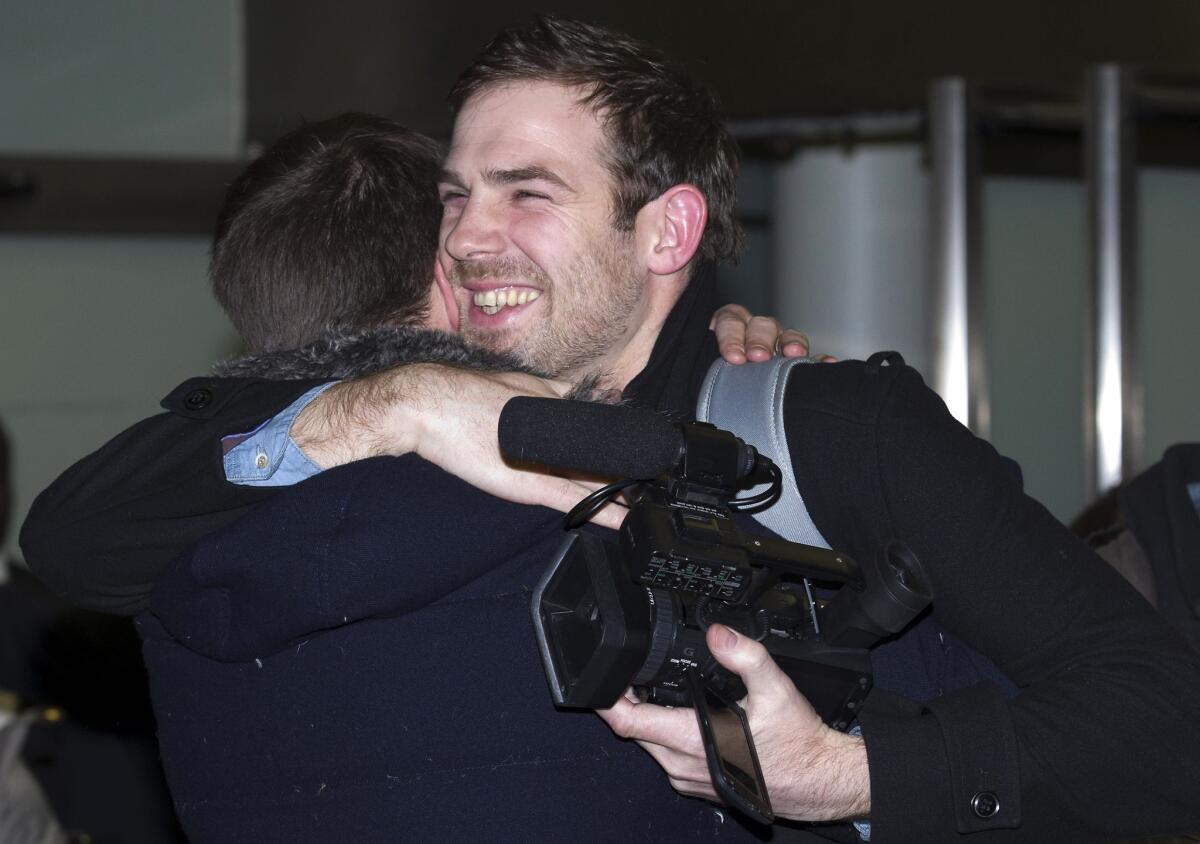British Greenpeace activists back home after release from Russia

- Share via
LONDON -- Five British Greenpeace activists arrived in London on Friday after their release from detention in Russia, saying their goal of fighting Arctic oil development remained unchanged but that their tactics might need some adjustment.
“I’ve gone through a lot for this campaign, I’m not going to stop now,” one of the released activists, Alexandra Harris, told Britain’s Sky News.
The five were among 30 people arrested in September aboard a Greenpeace ship after some of them attempted to raise a banner on an offshore platform belonging to the Russian energy giant Gazprom. The attempt was thwarted, and the next day, Russian commandos dropped onto their ship from helicopters, seized it and detained all aboard.
They were held for more than 60 days before being released on bail, and only recently were freed to leave Russia after authorities granted them amnesty, effectively closing the case.
“It’s good to be back and speaking English,” said Anthony Perrett, with a relieved smile. Jail conditions were difficult, he said: “Deep snow, locked in a cell for 23 hours a day ... but it’s been worth it.”
The five Britons arrived in London’s St. Pancras station on the Eurostar train from Paris and were greeted by a media crowd as well as family, friends and well-wishers.
Perrett, Harris, Phil Ball, Iain Rogers and freelance videographer Kieron Bryan chatted with reporters and posed happily for photos before joining their families for long-awaited trips home.
The group was initially charged with piracy, but those charges were reduced to hooliganism after Russian President Vladimir Putin questioned the notion of the environmentalists being pirates. Many saw their ultimate release as part of Putin’s efforts to improve Russia’s international image ahead of the coming Winter Olympics in Sochi.
The piracy charges were “absurd,” said Perrett, 32, who described his concern at the lack of visible justice in Russia. “There were some farcical moments,” he said. “You were in a courtroom but no one asked any questions.” He said he remained uncertain of his ultimate fate “until the [airplane] wheels hit the ground” as they arrived in France.
British Minister for Europe David Lidington said Friday that he was “delighted” at the release of the activists, adding that “I am also pleased that two members of Pussy Riot and a number of the Bolotnaya protesters have been released.”
He was referring to the amnesty granted in the last week to two members of the punk rock group Pussy Riot, jailed for more than a year for performing an anti-Putin song at Moscow’s main Orthodox cathedral, and to opposition activists who were arrested during massive anti-Putin protests in May 2012 at Moscow’s Bolotnaya Square.
“Whilst this move is welcome, issues of concern remain with the Russian judicial system. The British government continues to call on the Russian authorities to strengthen the rule of law, tackle corruption and promote independence of the judiciary,” Lidington said
Perrett said the members of the group would not stop their activism. “It was absolutely worth it in our campaign to save the Arctic,” he said -- but added that he would consider “different tactics and techniques.”
More to Read
Sign up for Essential California
The most important California stories and recommendations in your inbox every morning.
You may occasionally receive promotional content from the Los Angeles Times.










